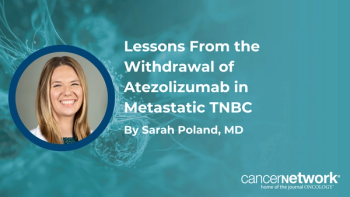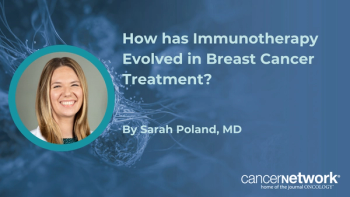
Oncology NEWS International
- Oncology NEWS International Vol 9 No 11
- Volume 9
- Issue 11
Conjugated Linoleic Acid Inhibits Breast Cancer Carcinogenesis
WASHINGTON-Conjugated linoleic acid (CLA) shows evidence of inhibiting mammary carcinogenesis and angiogenesis in both animal and in vitro models, said Margot M. Ip, PhD, professor of pharmacology and therapeutics, Roswell Park Cancer Institute.
WASHINGTONConjugated linoleic acid (CLA) shows evidence of inhibiting mammary carcinogenesis and angiogenesis in both animal and in vitro models, said Margot M. Ip, PhD, professor of pharmacology and therapeutics, Roswell Park Cancer Institute.
Conjugated linoleic acid acts in two ways, Dr. Ip said at the 10th Annual Research Conference of the American Institute for Cancer Research (AICR). It directly inhibits growth of mammary epithelial cells by inhibition of DNA synthesis and stimulation of cell death.
Conjugated linoleic acid is a fatty acid found in trace amounts in meats and dairy products; it is synthesized by bacteria in the rumen of the source animals. Long-term studies have already shown that feeding CLA to rats cuts mammary tumor incidence in half. Other data indicate inhibition of skin and forestomach carcinogenesis.
In Vitro Studies
Using mammary epithelial cells from rats in culture, Dr. Ip found that CLA (but not linoleic acid) inhibits the growth of normal mammary epithelial cells and inhibits DNA synthesis.
Dr. Ip also observed a 3.5-fold increase in apoptosis of normal mammary epithelial cell organoids and an inhibition of the growth rate of mammary tumor cells.
Stromal-epithelial interactions are crucial for the normal development of the breast, Dr. Ip said. Conjugated linoleic acid modifies the differentiation of stromal cells and thus indirectly affects the growth of both normal and malignant mammary epithelial cells.
This occurs by inhibition of DNA synthesis and stimulation of apoptosis, not through changes in activation or localization of protein kinase C, she said.
Mammary stromal cells, she said, have stem-cell-like properties and can be induced to form fibroblasts, adipocytes, or capillary-like cells, depending on the hormones or growth factors in the culture medium or whether the cells are grown on an extracellular matrix.
Conjugated linoleic acid, too, stimulates differentiation of mammary stromal cells to adipocytes that can accumulate lipid. At the same time, CLA inhibits in vitro vasculogenesis. Given all this, Dr. Ip wanted to know if CLA could inhibit angiogenesis in vivo as well, and studies to address that are currently underway.
One problem for potential human consumption of CLA is that it is normally found in high-fat foods, Dr. Ip said, but it might be added to low-fat dairy or other products at the processing stage.
Articles in this issue
over 25 years ago
Joe & Ali Torre Lead ‘Two Against One’ Prostate Cancer Campaignover 25 years ago
Efforts to Reduce Tobacco Deaths May Fail in the Short Termover 25 years ago
Data Published for First-Line Irinotecanover 25 years ago
Manufacturing Capability a Factor in Success of New Biologicsover 25 years ago
Report Finds States Not Using Tobacco Funds for Preventionover 25 years ago
NCI Intramural Program Challenged to ‘Reinvent Itself’over 25 years ago
Surgery Supported for Recurring Colorectal Cancerover 25 years ago
Breast Cancer Stamp Funds $6.7 Million in 2-Year NCI Grantsover 25 years ago
Human Side of Cancer Offers Insights on Coping With the DiseaseNewsletter
Stay up to date on recent advances in the multidisciplinary approach to cancer.



















































